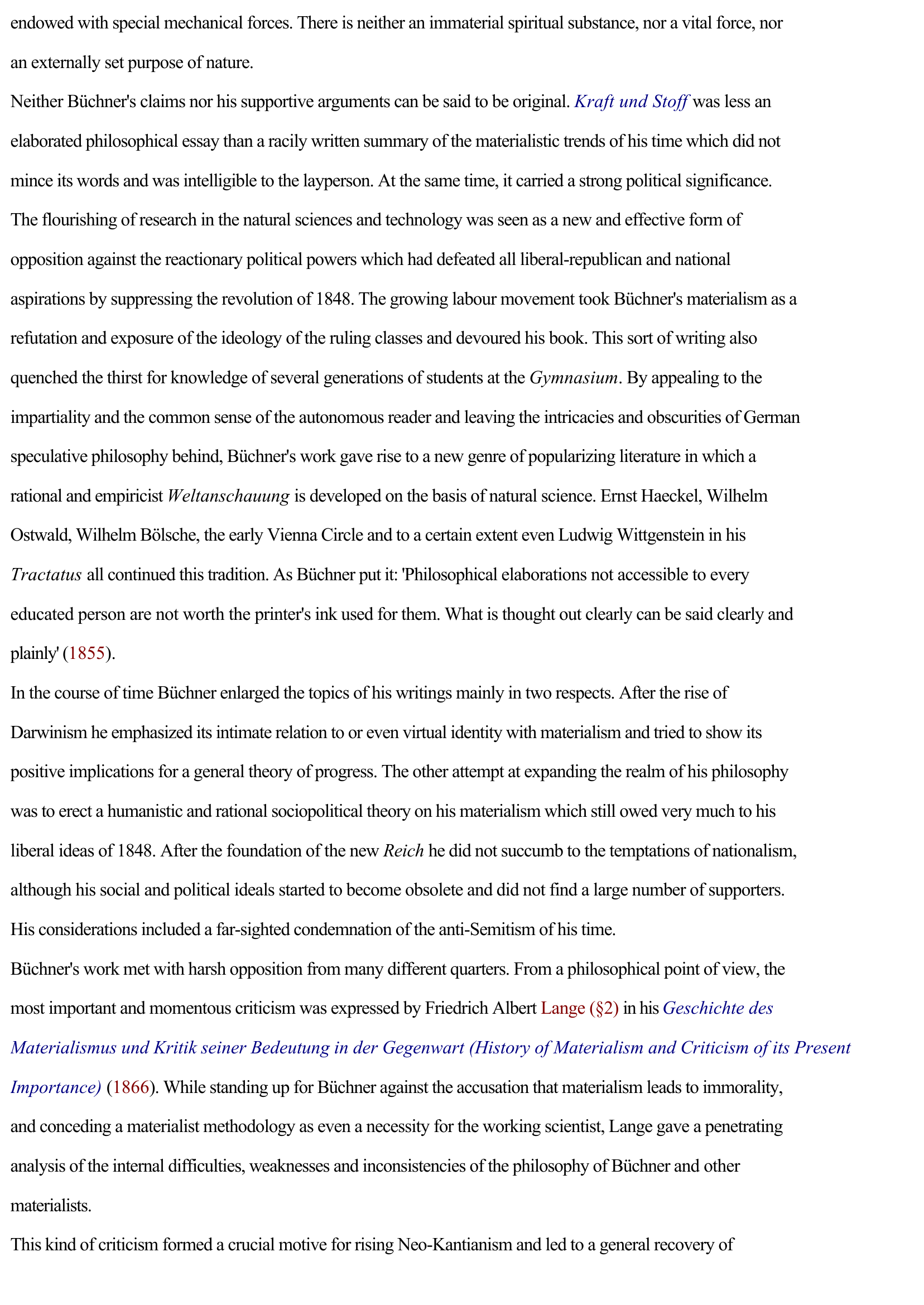Büchner, Friedrich Karl Christian Ludwig (Louis) ?
Publié le 22/02/2012

Extrait du document
«
endowed with special mechanical forces.
There is neither an immaterial spiritual substance, nor a vital force, nor
an externally set purpose of nature.
Neither Büchner's claims nor his supportive arguments can be said to be original.
Kraft und Stoff was less an
elaborated philosophical essay than a racily written summary of the materialistic trends of his time which did not
mince its words and was intelligible to the layperson.
At the same time, it carried a strong political significance.
The flourishing of research in the natural sciences and technology was seen as a new and effective form of
opposition against the reactionary political powers which had defeated all liberal-republican and national
aspirations by suppressing the revolution of 1848.
The growing labour movement took Büchner's materialism as a
refutation and exposure of the ideology of the ruling classes and devoured his book.
This sort of writing also
quenched the thirst for knowledge of several generations of students at the Gymnasium .
By appealing to the
impartiality and the common sense of the autonomous reader and leaving the intricacies and obscurities of German
speculative philosophy behind, Büchner's work gave rise to a new genre of popularizing literature in which a
rational and empiricist Weltanschauung is developed on the basis of natural science.
Ernst Haeckel, Wilhelm
Ostwald, Wilhelm Bölsche , the early Vienna Circle and to a certain extent even Ludwig Wittgenstein in his
Tractatus all continued this tradition.
As Büchner put it: 'Philosophical elaborations not accessible to every
educated person are not worth the printer's ink used for them.
What is thought out clearly can be said clearly and
plainly' (1855 ).
In the course of time Büchner enlarged the topics of his writings mainly in two respects.
After the rise of
Darwinism he emphasized its intimate relation to or even virtual identity with materialism and tried to show its
positive implications for a general theory of progress.
The other attempt at expanding the realm of his philosophy
was to erect a humanistic and rational sociopolitical theory on his materialism which still owed very much to his
liberal ideas of 1848.
After the foundation of the new Reich he did not succumb to the temptations of nationalism,
although his social and political ideals started to become obsolete and did not find a large number of supporters.
His considerations included a far-sighted condemnation of the anti-Semitism of his time.
Büchner's work met with harsh opposition from many different quarters.
From a philosophical point of view, the
most important and momentous criticism was expressed by Friedrich Albert Lange (§2) in his Geschichte des
Materialismus und Kritik seiner Bedeutung in der Gegenwart (History of Materialism and Criticism of its Present
Importance) (1866 ).
While standing up for Büchner against the accusation that materialism leads to immorality,
and conceding a materialist methodology as even a necessity for the working scientist, Lange gave a penetrating
analysis of the internal difficulties, weaknesses and inconsistencies of the philosophy of Büchner and other
materialists.
This kind of criticism formed a crucial motive for rising Neo-Kantianism and led to a general recovery of.
»
↓↓↓ APERÇU DU DOCUMENT ↓↓↓
Liens utiles
- LE « MANIFESTE DU PARTI COMMUNISTE » DE KARL MARX ET FRIEDRICH ENGELS
- Le personnage de FIESQUE Jean-Louis de, comte de Lavagna de Friedrich von Schiller
- MANIFESTE DU PARTI COMMUNISTE, Karl Marx, 1818-1883, et Friedrich Engels, 1820-1895
- IDÉOLOGIE ALLEMANDE (L’), Karl Marx & Friedrich Engels - étude de l'œuvre
- DIX-HUIT BRUMAIRE DE LOUIS BONAPARTE (LE), Karl Marx - résumé de l'œuvre

































